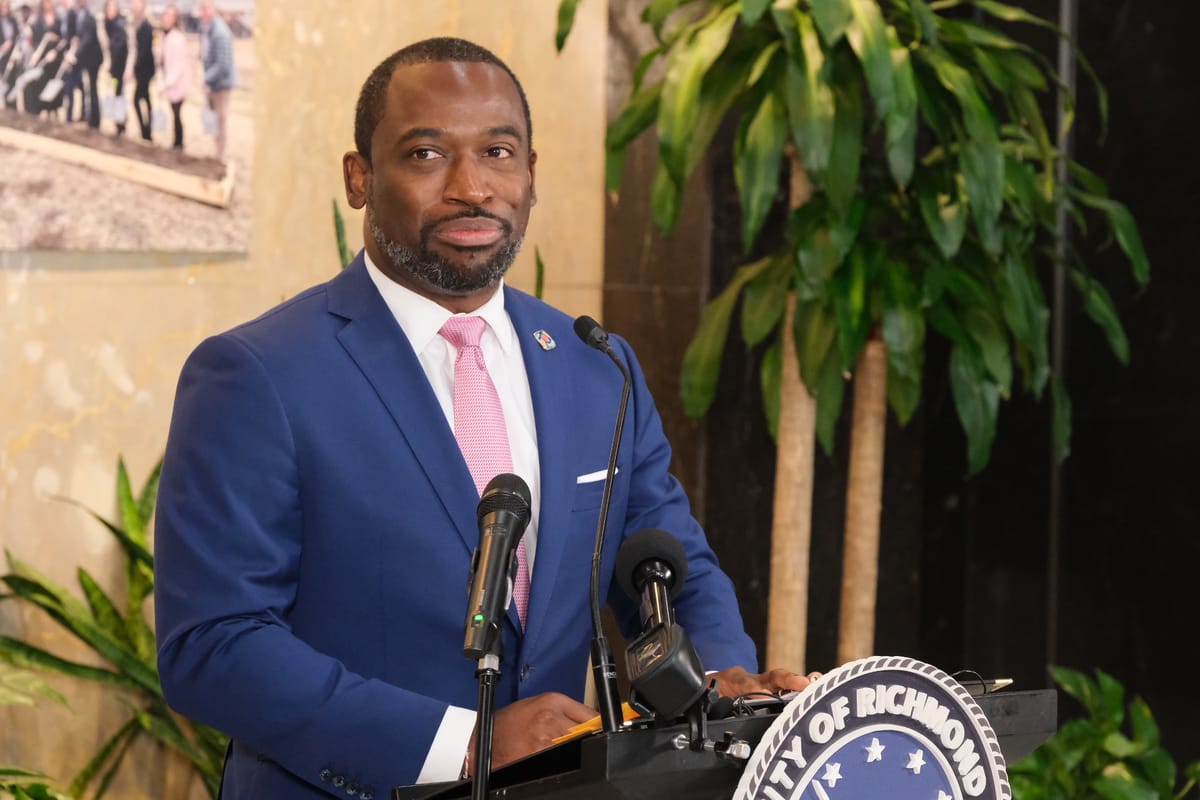Stoney says he'll give an endorsement for mayor. Who wants it?

As Richmond Mayor Levar Stoney prepares to leave office after almost eight years, he says he plans to endorse someone to take the job next.
He hasn’t given many hints about who he has in mind when asked about his possible endorsement at two recent news conferences. But without naming names, he said some of the five candidates running for mayor have sought his support.
In interviews with The Richmonder, the mayoral hopefuls said they haven’t directly asked Stoney to back their campaigns. But some are open to the idea.
“Levar still has a lot of support in the community. I would say that’s particularly true in the African-American community,” said Dr. Danny Avula, who’s running for mayor after leading Virginia’s vaccination effort during the COVID-19 pandemic. “I think he’s done some really good things for the city.”
Avula said he hasn’t “explicitly” asked for Stoney’s support but would welcome it.
“I would be thrilled if he recognized that there were things that I could bring to continue the work that he started,” he said. “That would mean a lot.”
Former finance professional and software investor Harrison Roday also said he hasn’t asked for Stoney’s backing.
“What I have shared with the mayor is that I believe this is a change election, and that people are looking for change,” Roday said. “And while there might be ways the mayor and I could partner together and understand what common goals we have, I have not sought his endorsement.”
The prospect of a Stoney endorsement reflects one of many complicated dynamics at play in the 2024 mayoral contest. Though all five candidates seeking the office are calling for reform at City Hall and improvement in basic city services, they have rarely taken direct aim at the incumbent mayor or directly blamed Stoney for the billing and tax dysfunction Richmond residents and businesses have experienced during his time in office.
At several of the mayoral forums being held around the city, Stoney has gone mostly unmentioned as the candidates stick to forward-looking messages about the type of leader they’d be.
Former Richmond City Council president Michelle Mosby also said she hasn’t asked for Stoney’s backing. She sounded neutral on the idea of getting it.
“I think that that's a decision he needs to make,” said Mosby, who owns a South Richmond hair salon and runs a nonprofit focused on prisoner reentry services.
City Councilor Andreas Addison (1st District), who has supported many of Stoney’s policy initiatives as the only current officeholder running for mayor, said he hasn’t asked for Stoney’s endorsement because “I need to run my race.”
“I wouldn't say no to it. I wouldn't like, Heisman,” Addison said, making a football stiff-arm gesture. “But I’d have to be very specific on, like, what would this endorsement really help me with?”
Self-described community organizer and entrepreneur Maurice Neblett said he hasn’t spoken to Stoney.
“My main focus has been on the people,” Neblett said. “My main focus has not been on endorsements.”
Stoney, who’s now seeking the Democratic nomination for lieutenant governor, said Wednesday that he wants to hear more from the candidates about which of his policies they’d continue and which they disagree with.
“It’s a whole lot different to talk about the job than doing the job,” he said.
How do mayoral candidates grade Stoney’s performance?
At a mayoral forum earlier this month hosted by the Jewish Federation of Richmond and the Rotary Club of Richmond, Richmond Times-Dispatch columnist Jeff Schapiro asked the candidates to review Stoney’s performance in the office. Specifically, he asked for answers in the form of an A-F letter grade.
Mosby went first and gave Stoney a C.
“He could have done a better job of listening. I do not think that he does listening well,” Mosby said, going on to say Stoney was dealt some difficult circumstances by being mayor during the COVID-19 pandemic and the social unrest of 2020. Things could have gone differently under Stoney, she said, with City Hall’s “systems and services.”
Neblett said he didn’t feel “comfortable enough” to give a grade.
“Once you get a position, you see the issues that are at hand,” he said. “You see the issues and tools you have to work with.”
Roday took a similar approach, declining to give a grade and saying he felt Richmonders were capable of “nuanced views” on Stoney’s time in office.
“We appreciate this administration’s advocacy for things like fare-free transit and talking about affordable housing as an important issue, while also pointing out clear areas of policy disagreement whether it’s been with certain approaches for economic development or the way the administration has conducted its business,” Roday said. “We’re all adults. I think we’re capable of having that conversation.”
Addison gave Stoney a C+.
After serving on the City Council for all of Stoney’s tenure, Addison said, there’s been “progress” to be proud of like the better condition of the city’s formerly pothole-filled streets and improvements to the region’s newly fare-free bus service. But with a more collaborative leadership style, Addison said, Stoney could’ve gotten more done.
“The things he’s touted as his successes could have been bigger,” Addison said. “They could have been more. And had he worked with council, I think we could have gotten even better outcomes.”
Avula gave Stoney an “E for effort.”
He said Richmond is “decidedly a better place” than it was 10 or 20 years ago, but still has room for improvement.
“I think the area you’re looking for that probably needs the most investment and help is an investment in the gears of local government,” Avula said. “Ensuring that the basic functions and responsiveness of local government exist to serve the people of Richmond.”






